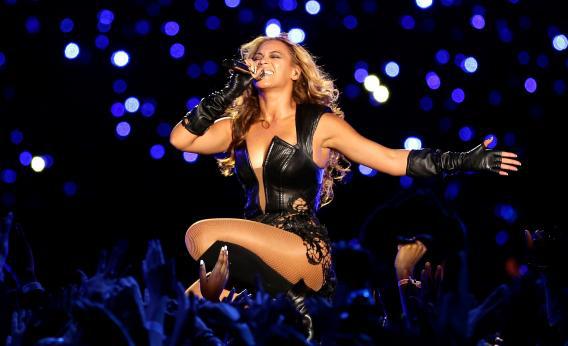On the heels of her electric Super Bowl halftime show last night, Beyoncé has announced the dates for her world tour, “The Mrs. Carter Show.” The tour’s title nods to her husband, Jay-Z, of course, whose given name is Shawn Carter.* Considering how open the two have been about their mutual love for one another—see “Countdown,” her musical love letter to him, or listen to the rapper talk about her in interviews—the tour name shouldn’t come as much of a surprise.
But as a woman who has earned enough clout to inspire dance crazes, earn lucrative (if controversial) advertising deals, and perform for the U.S. president on multiple occasions, one can’t help but wonder why she felt the need to evoke the name of her beau in her solo world tour. Is this a step back in the ongoing debate about “Beyoncé-as-feminist”?
Perhaps. But then, that has never been a simple argument for either side. When Destiny’s Child released their second album in 1999, The Writing’s on the Wall, the group, led by Beyoncé, announced their plans to carry on the torch of female empowerment in R&B from reigning trio TLC: “Bills, Bills, Bills” and “Say My Name” touted a “take no mess” stance from the men in their lives, and many women (not to mention young girls, such as myself at the time) sang along with pride. The girl group made the message more explicit two later years later with “Independent Women (Part I),” an anthem that asked their female audience to “throw your hands up” if you were making your own money and didn’t have to rely on men, financially or otherwise. A 2001 Times article on feminism in music called 19-year-old Beyoncé, by then sharing co-writing credits on nearly all of the group’s songs, “as successful, and as resolute, as the middle-aged women who spent decades in power suits.”
Some went so far as to complain that Destiny’s Child were “male-bashing,” a foolish charge that ignored songs like “Confessions” and the subservient “Cater 2 You.” And since going solo, Beyoncé has continued to toe the line of promoting a girl-power mantra while staying conventionally sexy for her male (and female) audience, singing “Me, Myself and I” at one moment and proclaiming she’ll be your “Naughty Girl” in the next.
That’s one of the reasons many women don’t take the singer seriously as any sort of feminist icon. And marrying the man who recorded the incredibly misogynistic “Big Pimpin’” has further complicated the Beyoncé-as-feminist narrative. The ubiquitous “Single Ladies (Put a Ring On It)” has been derided by some as a hollow ode to girl power; Amanda Hess, now a contributor at Slate, named the song one of her top “pseudo-feminist” anthems.
The push back against the singer’s feminist credentials reached a high point of sorts with the release of “Run the World (Girls).” Writing for Essence, Demetria L. Lucas criticized the video for contradicting the song’s supposed message:
What do gyrating, garter-wearing women, twerking-off (while sending a shout to college grads, no less) against a male army in the remote desert have to do with women running the world? My takeaway is that if a woman ever wants to be a conquering queen, the power of the P is her best weapon of choice.
On YouTube, video blogger NineteenPercent took Beyoncé to task in a well-executed (and very popular) rant debunking the song’s lyrics by holding them up against real-life statistics. After quoting the lyric, “Make your check come at they neck,” NinteenPercent counters, “Indeed, go to work and make your check, but be aware that your check is going to be significantly smaller than your male counterparts.”
Beyoncé has herself danced around the debate. “I think I am a feminist, in a way. It’s not something I consciously decided I was going to be,” she said in 2010. That statement seems right on the nose. She has toured with an all-female band since B’Day in 2006. (“I wanted to get together a group of fierce, talented, hungry, beautiful women and form an all-girl band,” she told MTV.) And she has displayed incredible business-savvy and an enviable work ethic. Despite being married to the equally successful Jay-Z, and despite becoming a mother, she’s refused to step back from the limelight, something most feminists would probably applaud her for.
But attaching her married name to a tour which everyone will be clamoring to see, not because of her husband, but because of her own almost indisputable status as the biggest pop star in the world? It’s confounding, if not entirely surprising—just like, for that matter, the rest of Beyoncé’s oeuvre to this point.
*Correction, Feb. 4: This post originally referred to Shawn Carter as Jay-Z’s legal name. According to the Boston Globe, Jay-Z, born Shawn Carter, changed his surname to Knowles-Carter in 2009, making Beyoncé’s decision to single out her husband’s name even more confusing. Perhaps his next tour will be the “Mr. Knowles Show”?
